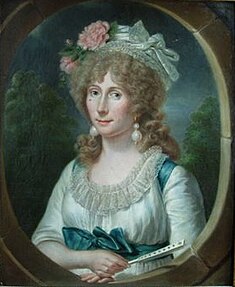Portrait by A. Labille-Guiard, 1791
Julie Candeille (1767-1834) was a French composer, librettist, singer, actress, instrumentalist, and author active in revolutionary France. As a child prodigy she performed as a singer, harpist, and pianist for the King and in public. At the age of 15 she sang the title role in Gluck’s Iphigénie en Aulide, and she subsequently made her debut at the Concert Spirituel where she played a concerto by Clementi to great acclaim. The next year, she played one of her own concerti at the same venue.
Candeille also worked as an actress and composed dramatic music and wrote her own plays, for which she often played the title roles. Her most successful stage work was the 1792 Catherine, ou La belle fermière, which was performed more than 150 times during the next three decades. It was widely published and performed in Paris, Brussels, Lille, Bordeaux, and Amsterdam where it was translated to Dutch.
Beginning in 1802 she gave piano lessons in her Paris home and published music, essays, memoirs, and several historical novels. She sought political asylum in England during the 100 Days, and returned to Paris in 1816 having been awarded a sizable pension by Louis XVIII.
Candeille advocated for the professional ambitions of other women musicians, including Sophie Bawr, Hélène de Montgeroult and Pauline Duchambge. Her compositional output includes stage works, vocal music, a piano concerto, and solo piano works.
Source
Rushton, Julian, Julie Anne Sadie, Robert Adelson, and Jacqueline Letzter. “Candeille, (Amélie) [Emilie] Julie.” Grove Music Online. 2001.
Works Featured on Expanding the Music Theory Canon
Cantabile from Sonata 2, Op. 8
Full Score
Page: Binary
Andante Agitato from Sonata 3, Op. 1
Excerpt
Page: Period
Andante Agitato from Sonata 3, Op. 1
Excerpt
Page: Sentence
Allegro from Sonata 1, Op. 1
Excerpt
Page: Period
Romance de Catherine
Excerpt
Page: Submediant
